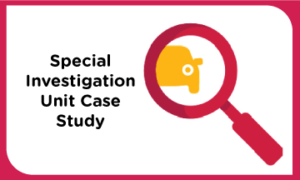According to the National Insurance Crime Bureau, “Tow truck scams have grown to become a major issue across the country.” One common tactic involves inflating prices. Dishonest operators may charge exorbitant fees for seemingly simple tows, adding unnecessary mileage, labor, and/or storage charges. They may also pressure drivers to sign blank documents, allowing them to add fraudulent charges later. These scams can leave drivers with unexpected and significant financial burdens. At Maryland Auto, we diligently monitor tow truck charges to identify and prevent fraud.
We recently investigated a case that initially appeared to be an instance of a tow truck company scamming one of our policyholders. However, it was ultimately revealed that the policyholder lacked credibility. As the investigation progressed, the details surrounding the claim became increasingly suspicious, prompting a referral to our Special Investigations Unit (SIU) for further examination.
This claim was reported to Maryland Auto by our policyholder over a month after the incident. She described being stopped in traffic when another vehicle struck the car behind her. The at-fault driver then struck the policyholder’s vehicle on the passenger side before proceeding through a red light, causing further collisions.
The Baltimore City Police arrived at the scene and completed a report detailing the crash. The report indicated that only one vehicle, not the policyholder’s, was towed.
The policyholder’s vehicle was insured with liability coverage only, and it was discovered that the at-fault party was uninsured. As a part of the Uninsured Motorist investigation, the insured vehicle was inspected and sustained less than $9,000 in damage.
The policyholder later submitted an invoice from a towing company totaling more than $21,000. Most towing bills after crashes are less than $1,000. The invoice did not list any information, such as where the vehicle was picked up or the VIN. The bill was dated four days after the crash.
The claim was referred to SIU for further investigation due to the extreme expense of the towing bill, coupled with the police report indicating that the insured vehicle was not towed from the scene of the crash.
The SIU investigator requested body-worn camera footage from the responding officer, which did not show the insured vehicle being towed from the scene. However, the footage shows the policyholder confirming to the officer that her vehicle was drivable.
An Examination Under Oath (EUO) was conducted with the policyholder and her attorney. She couldn’t answer simple questions, such as why it took her so long to report the claim.
The policyholder explained that her vehicle was towed from the scene because it was not drivable due to a missing muffler. She arranged for the towing herself and chose a company that came highly recommended by a friend.
The policyholder explained that only one person arrived to tow her vehicle, and the tow truck driver had to lift the car onto the truck with a winch. No special equipment was used, and the tow company did not clean up any debris from the scene despite these items being on the tow bill. She mentioned that the tow company did not explain the reasons for the high tow cost, nor was it made clear who was responsible for paying the bill. Additionally, the policyholder could not explain why the invoice had a date different from the incident. The policyholder was not asked to sign any documents from the tow company or pay any money for the tow or storage of her vehicle despite it being stored on the tow lot for over a month.
The policyholder, who also claimed to be unemployed, stated that while she occasionally drove for a rideshare service, she was not working in that capacity at the time of the accident.
The SIU investigator requested specific records and documentation from the policyholder and attorney, such as contact information for the friend who recommended the tow company, screenshots of the towing application used to request the tow, and screenshots from the rideshare application, but there has been no response.
Due to the inconsistencies regarding the towing charges and the statement from the policyholder, the investigator determined that her testimony was not credible, and the claim was denied. Maryland Auto then forwarded the case to the Maryland Insurance Administration’s Insurance Fraud Division for further investigation.
Although this particular case didn’t ultimately turn out to involve a tow truck scam, Maryland Auto remains committed to protecting our policyholders, claimants, and all Maryland residents from predatory towing practices.




